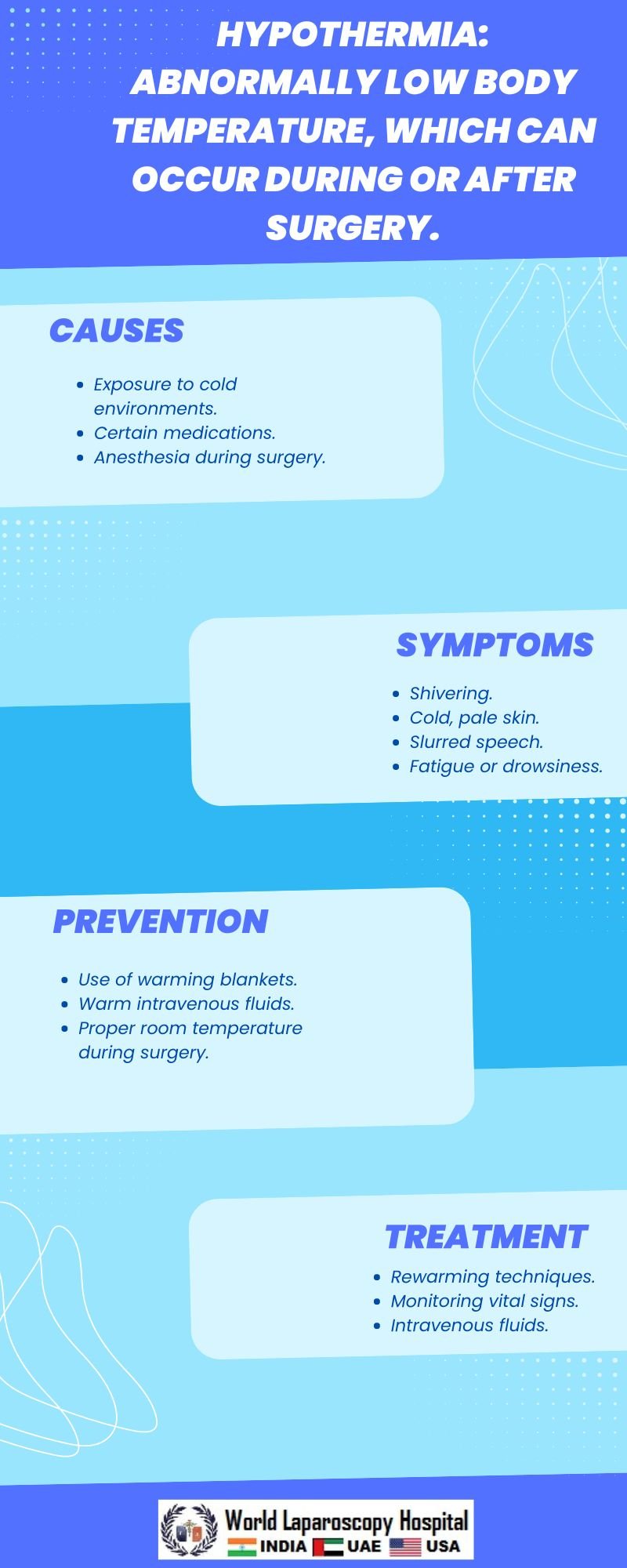Hypothermia: Abnormally low body temperature, which can occur during or after surgery.
Introduction
Hypothermia is a condition characterized by abnormally low body temperature, typically below 95°F (35°C). It can occur during or after surgery, presenting a range of challenges for healthcare providers and patients. In this article, we will explore the causes and effects of hypothermia in surgical patients, as well as the strategies used to prevent and manage this condition.

Causes of Hypothermia in Surgical Patients Surgical procedures often involve exposing patients to cold operating room environments, as well as administering anesthesia, which can interfere with the body's ability to regulate temperature. These factors, combined with the use of cold intravenous fluids and the body's natural response to stress, can contribute to the development of hypothermia in surgical patients.
Effects of Hypothermia Hypothermia can have a number of negative effects on surgical patients, including:
- Increased risk of surgical site infections: Hypothermia can impair the immune response, increasing the risk of infection at the surgical site.
- Cardiovascular complications: Hypothermia can lead to a decrease in heart rate and blood pressure, as well as changes in heart rhythm, which can be dangerous for patients with pre-existing heart conditions.
- Prolonged recovery times: Hypothermia can slow the body's metabolism, leading to delayed recovery from surgery and longer hospital stays.
- Impaired wound healing: Hypothermia can impair blood flow to the surgical site, leading to delayed wound healing and increased risk of complications.
Prevention of Hypothermia Preventing hypothermia in surgical patients is a key goal for healthcare providers. Strategies for preventing hypothermia include:
- Preoperative warming: Preoperative warming can help to raise the patient's core body temperature before surgery, reducing the risk of hypothermia during the procedure.
- Warm intravenous fluids: Using warmed intravenous fluids can help to maintain the patient's body temperature during surgery.
- Forced air warming: Forced air warming systems can be used during surgery to help maintain the patient's body temperature.
- Warm blankets: Wrapping the patient in warm blankets before, during, and after surgery can help to prevent hypothermia.
Management of Hypothermia If hypothermia occurs during or after surgery, it is important to manage it promptly to prevent complications. Management strategies include:
- Passive rewarming: Passive rewarming techniques, such as removing cold clothing and covering the patient with warm blankets, can help to raise the patient's body temperature.
- Active rewarming: In more severe cases of hypothermia, active rewarming techniques, such as the use of heated blankets or forced air warming systems, may be necessary.
- Monitoring: Monitoring the patient's core body temperature regularly can help to ensure that hypothermia is detected and managed promptly.
Conclusion
Hypothermia is a common complication of surgery, but it can be prevented and managed effectively with the right strategies. By understanding the causes and effects of hypothermia, as well as the strategies used to prevent and manage it, healthcare providers can help to ensure the best possible outcomes for surgical patients.
The consequences of hypothermia in surgical patients are serious. It increases the risk of surgical site infections due to a weakened immune response, leads to cardiovascular complications such as decreased heart rate and blood pressure, and can cause arrhythmias. Additionally, hypothermia can prolong recovery times and impair wound healing due to reduced metabolic rate and blood flow.
Preventing hypothermia is crucial and can be achieved through several strategies: preoperative warming, using warm intravenous fluids, employing forced air warming systems, and wrapping patients in warm blankets. Prompt management of hypothermia, involving passive and active rewarming techniques and regular monitoring, is essential to mitigate its effects and ensure patient safety.
| Older Post | Home | Newer Post |


